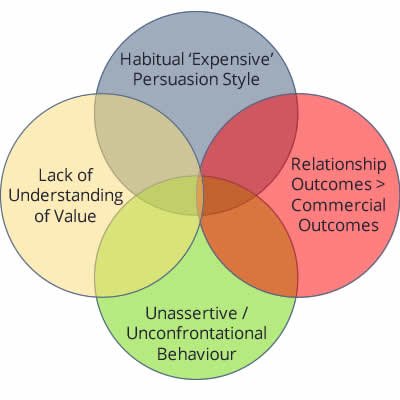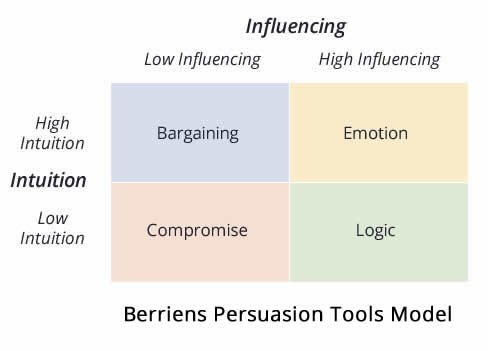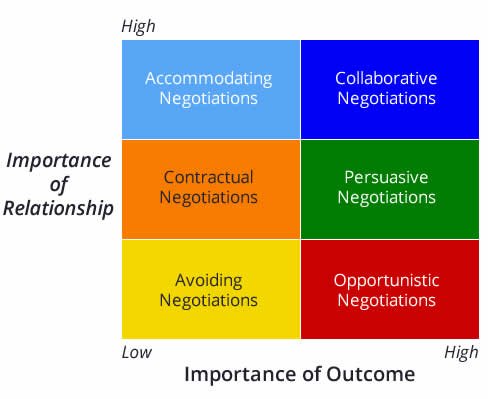When negotiating, a good mindset to adopt is the one that says everything has a value and that nothing should be given away for free.Yet, far too often well-intentioned or naïve negotiators give away items to the other party when they need not.The irony being that by giving it away too easily, its value becomes much diminished for the recipient.
Let me share two related but different perspectives on this:
So, the message is simple; the next time you feel like you may make a concession and give away something for free, STOP!Think again, carefully.

In our experience, there are four major factors which govern the tendency to give away value:
These are explained in greater detail in the table below.
Interestingly, these are all about mindset, or attitude, before and during the negotiation.Negotiators who are lacking in confidence, unassertive, or naïve tend to give away value.If you are happy with leaving some money on the negotiating table, that is fine – you could carry on as you are.However, our advice is to make sure that the other party appreciates the true value of what you are giving to them for free – look them in the eye and make it clear that this is a deliberately generous gesture and not an amateur oversight.
However, if your margins are being squeezed and the other party is taking advantage of your goodwill or naivety, you may need to change your mindset.It sounds easy, but it is not.
First of all, get over yourself and start thinking commercially about this issue.Just how much is this factor worth to the other party and how much is it costing you?The analysis can be shockingly revealing.
Second, in almost every negotiation, there is an element of confrontation between the two positions; get used to it!It is not personal.Those who are well prepared and rehearsed, warmly assertive (without being aggressive) and who have done their homework beforehand will be comfortable with the confrontation, manage it well, and will understand how to use their value and will be rewarded for this.

The negotiator has a habitual tendency for expensive persuasion styles rather than free ones. Kenneth Berrien identified four persuasion tools as shown below. He developed a simple model for persuasion based on a person’s intuition and influencing skills. Two of these persuasion skills are expensive (Bargaining and Compromise) as they involve the transfer of tangible value. For many negotiators, Bargaining and Compromise are still the only ‘real style’ of negotiating – this is a big misconception. Emotion and Logic are free and therefore inexpensive, but are rarely used well. Less effective negotiators have inhibitions that prevent them using emotion effectively. Net net – they use expensive persuasion methods too quickly end up trading away value unnecessarily. So what? Well, we all need to re-learn and practise how to use the free persuaders better.

In many commercial negotiations, the balance of power is tilted firmly in favour of the buyer due to a psychological phenomenon related to the balance between the importance of the relationship versus the importance of the commercial outcome. Whilst the relationship is often very important, many sellers are too often enthusiastic, accommodating, ‘lose to win’ deliverers, who are soft on people and the problem and hence prefer to avoid confrontation. They are often seeking agreement in a friendly way so as to protect the relationship at all costs. We like them and they want to be liked. They are in the ‘light blue’ box.
Contrast that with the traditional or tactical buyers; someone who is confrontational and demands concessions as a condition of the relationship, who is hard on the people and the problem, whose goal is victory in a ‘win / lose’ contest and who will fight opportunistically for the commercial outcome with little or no regard for the impact on the relationship. These are in the ‘red’ box.
In this scenario, ask yourself who will make the commercial concessions first, and keep making them to protect the ‘relationship’? The ideal negotiator is driven by the importance of the relationship but also the importance of the outcome, and is prepared to be highly assertive when sticking to their goals.This psychological imbalance is compounded a lack of self-confidence and belief leading to overly quick concessions.There may even be a tendency to avoid confrontational or difficult negotiations altogether.Another facet of this behaviour is a propensity to be overly subservient to the customer (‘the customer is always right’) and a corresponding unwillingness to say ‘No’.These are major factors in not only soft negotiating styles, but also the preponderance of scope creep in Services Businesses.Whilst some of these traits can be addressed through training and coaching, there are also some people who are simply not cut out to be effective negotiators.
The fourth factor comes down to commercial naivety! The negotiator simply fails to grasp the value of the item they are giving away for the other party. In every negotiation, each party has things that they’re looking for. Similarly, in almost every negotiation people have things that are of little or no cost to them that are of high benefit to the other party. When we’re negotiating against somebody else, we may have something that we don’t really need or has little value to us, or we have it in great abundance that the other party would value and would be of benefit to them. You need to understand this when you’re negotiating. You need to understand the other party, what you have available and how it could benefit them; is there something that you have that they would like, or they value highly, that would be of benefit for them? For instance, if you’re negotiating for a service maybe you can provide them access to old articles or materials that you developed in the past for other reasons. This would cost you nothing but might be of huge benefit to the other party.